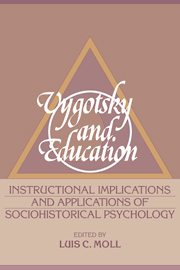Book contents
- Frontmatter
- Contents
- List of contributors
- Preface
- Acknowledgments
- Introduction
- Part I Historical and theoretical issues
- Part II Educational implications
- Part III Instructional applications
- 11 Changes in a teacher's views of interactive comprehension instruction
- 12 Learning to read and write in an inner-city setting: A longitudinal study of community change
- 13 Writing as a social process
- 14 Creating zones of possibilities: Combining social contexts for instruction
- 15 The zone of proximal development as basis for instruction
- 16 Detecting and defining science problems: A study of videomediated lessons
- 17 Assisted performance in writing instruction with learningdisabled students
- Name index
- Subject index
11 - Changes in a teacher's views of interactive comprehension instruction
Published online by Cambridge University Press: 05 June 2012
- Frontmatter
- Contents
- List of contributors
- Preface
- Acknowledgments
- Introduction
- Part I Historical and theoretical issues
- Part II Educational implications
- Part III Instructional applications
- 11 Changes in a teacher's views of interactive comprehension instruction
- 12 Learning to read and write in an inner-city setting: A longitudinal study of community change
- 13 Writing as a social process
- 14 Creating zones of possibilities: Combining social contexts for instruction
- 15 The zone of proximal development as basis for instruction
- 16 Detecting and defining science problems: A study of videomediated lessons
- 17 Assisted performance in writing instruction with learningdisabled students
- Name index
- Subject index
Summary
Although most research on teaching has centered on teachers' observable behaviors and their effects upon students, there has been an increasing emphasis on the study of teachers' thinking. In a major review of research on teachers' thought processes, Clark and Peterson (1986) outline a model of teacher thought and action. This model shows how different parts of the research on teachers' thinking relate to one another as well as to the much larger body of research on teachers' behaviors and effects on students. Clark and Peterson note that there is a reciprocal relationship between the domain of thought and the domain of action and argue that a full understanding of the process of teaching will come about only when the two domains are studied in relation to one another.
This general line of reasoning is supported by Vygotsky's work. One of Vygotsky's major contributions to psychological theory is the proposal that mind and behavior be reconceptualized so they can be studied in an integrated way (Minick, 1986). In the terms used by Clark and Peterson (1986), this proposal implies that the actual object of study should be the reciprocal relationship between teachers' thoughts and behavior, rather than either the domain of thought or the domain of action. From a Vygotskian perspective, it is argued that teaching behavior cannot be understood apart from the thought processes of the teacher.
- Type
- Chapter
- Information
- Vygotsky and EducationInstructional Implications and Applications of Sociohistorical Psychology, pp. 271 - 286Publisher: Cambridge University PressPrint publication year: 1990
- 9
- Cited by



